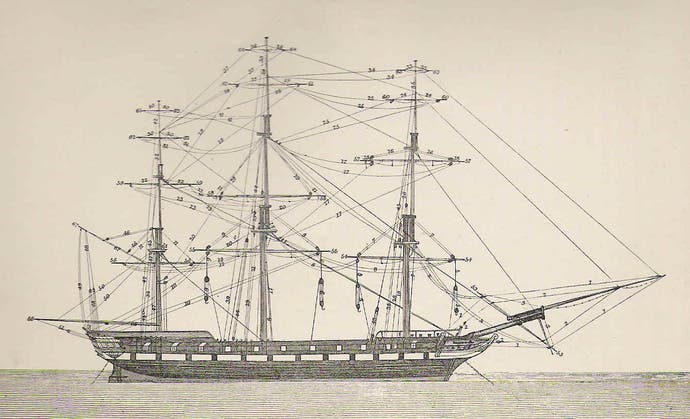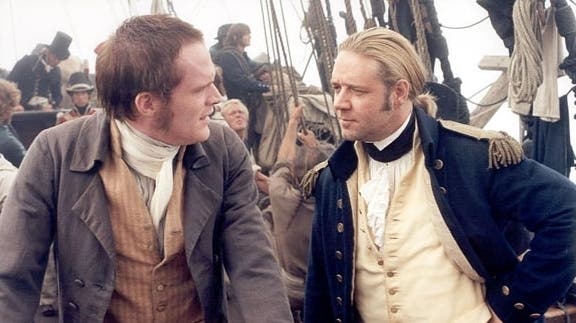Someone should make a game about: damn fine seamanship
Show me the ropes.
Who let the sea-dogs out? From knockabout pirate sim Sea of Thieves to pretty much every Assassin's Creed since 2012, life on the ocean wave has never been more accessible, even if voyaging across azure-blue oceans usually involves little more than holding down a button to sally forth, reducing the complex elemental interplay of tide and sail into something a little more manageable. But these foam-flecked games still evoke something of that salty, swashbuckling spirit of romance and adventure.
I have vestigial slivers of sailing knowledge in my hinterland, having spent a term's worth of secondary school Wednesday afternoons inexplicably in command of a single-sail Topper dinghy patrolling the opaque grey murk of a local loch. While presumably spending hours trying to coax a boom into a tacking turn my most vivid sense memories are of the warming post-session Pot Noodle. But in the many years since, I have devoured the Master and Commander novels of Patrick O'Brian, vicariously experiencing the excitement of life in the Napoleonic age of sail - all tall masts, grapeshot and weevil-infested ship's biscuit - through the daring exploits of "Lucky" Jack Aubrey and his lubberly surgeon sidekick Stephen Maturin.
By god, the O'Brian books are exhilarating. Immersive, too, in that the reader is bombarded with antique sailing terminology and simply expected to keep up. On the page, I have experienced dozens of sea battles at the shoulder of Aubrey, a lifelong mariner with almost preternatural skill when it comes to handling his ship. But while lustily whooping with joy at another daring Lucky Jack victory, I rarely have the foggiest idea of what has actually occurred: how the deployment of a specific sail at a specific time has somehow given our gutsy captain the strategic edge over a less-skilled opponent. (In this, the unsure reader can commiserate with the equally bemused Maturin, who has been known to mutter: "Clearly something terribly nautical and fascinating has just happened.")

That's why when I idly fantasise about my dream game, I imagine a rigorously modelled 19th century sailing simulator that not only goes full-bore on the technical detail but takes advantage of 21st century visualisation tools: sextant education, if you like. Two gaming experiences have made it seem feasible. Assassin's Creed: Black Flag went overboard with its production values, whipping up an essentially bare-bones sailing sideline into a glorious simulacrum of a living, breathing ship thanks to creaking rigging, bosun's shouts and scruffy avatars visibly straining at the wheel to come about. Much higher above the waves, stylish dogfighter Ace Combat 7: Skies Unknown featured not one but two (skippable) post-mission review sessions where you could fast-forward and rewind through your mission replay, adjusting camera angles as you went.
A wildly expensive overlapping of these games - in which sea, wind, sail are visualised in real-time to better explain their potential interactions - feels like the first step toward me finally understanding the concept of the weather gage, a nebulous condition state that grants one ship such an incredible advantage in any skirmish that apparently it is the equivalent of going first in noughts and crosses: yours to lose, essentially. Eventually, I would hope to know exactly what Aubrey means when he describes a ship as "weatherly, stiff and fast".
Demanding sailing sims already exist, of course, from the classic Napoleon: Total War to the more recent MMO Naval Action. But my (horn) pipe dream is to experience what it must be like to be Maturin rather than Aubrey; an observer to the action rather than the instigator, at least until I know my flying jib from my topgallant staysail. Is that even a game, really? Or would it just be a handsomely-realised holodeck version of life on a tall ship? If there was even the slimmest chance of unlocking a deeper appreciation of actual seamanship, I think it would be worth it. Anyone who has felt an unexpected flicker of excitement about the return of Microsoft Flight Simulator in 2020, a game where satisfaction will likely stem from technical understanding and mastery, might find themselves in the same boat.

